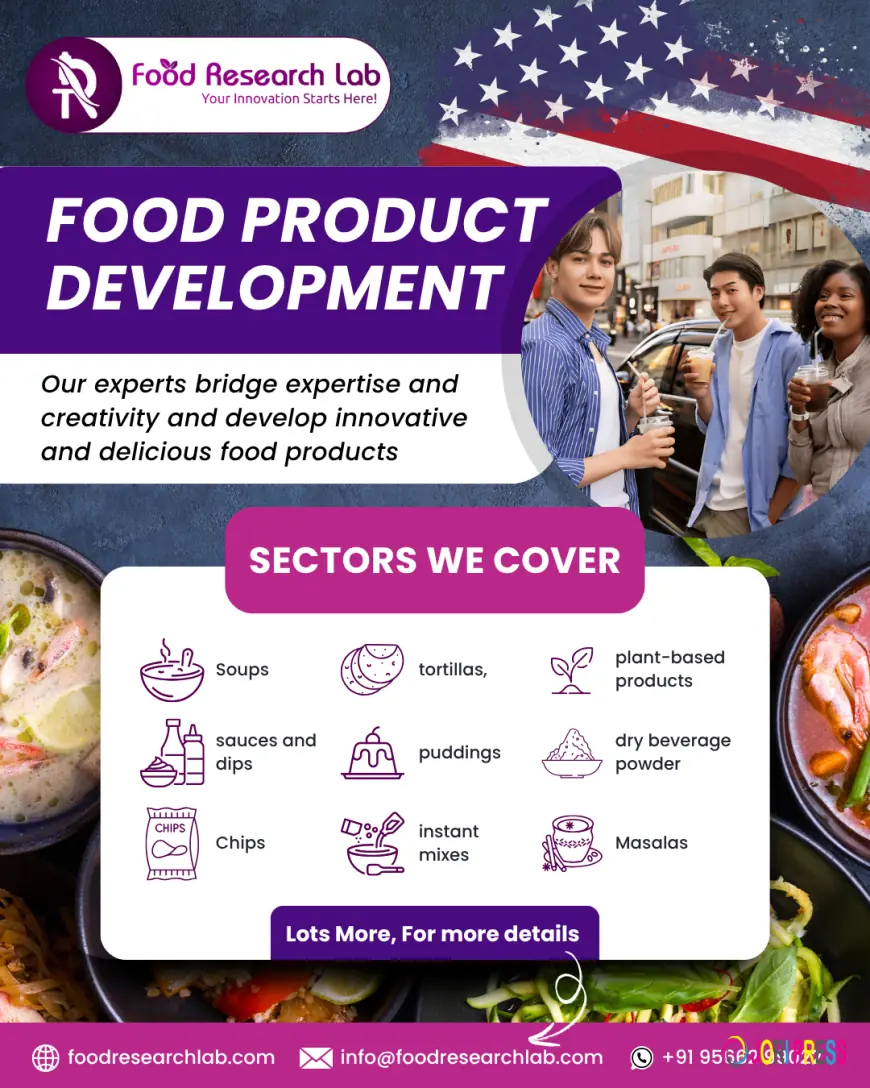Crafting Tomorrow’s Foods: A Complete Guide to Successful Food Product Development
Accelerate innovation with new food product development from Food Research Lab supporting idea creation formulation and market launch success.

Crafting Tomorrow’s Foods: A Complete Guide to Successful Food Product Development
Understanding the Future of Food Innovation
The global food industry is transforming rapidly as consumers seek healthier, fresher and more innovative products. To thrive in this environment, brands must invest in structured food product development that blends creativity, science and market forecasting. Modern consumers expect clean-label ingredients, unique flavours and products that support wellness. This makes new food product development an essential strategy for businesses aiming to shape the future of the food landscape.
Laying the Foundation Through Concept Exploration
Every product begins with an idea, but only well-researched ideas evolve into successful products. The early concept stage focuses on identifying consumer needs, analysing trends and visualising innovative possibilities. Companies study how nutritional preferences and flavour expectations are changing and use these insights to build strong product ideas. Expert food consultants often strengthen this stage by supporting idea validation, analysing competition and guiding brands toward feasible, market-ready concepts.
Feasibility and Market Viability
Not all ideas can succeed, and feasibility assessment helps brands determine which concepts are worth developing. This stage includes:
· Evaluating the cost and availability of raw materials
· Understanding regulatory and safety requirements
· Determining processing and manufacturing challenges
· Assessing shelf-life expectations and storage needs
· Analysing competitive products and market positioning
A clear feasibility study prevents costly mistakes and builds a strong foundation for product development in the food industry.
Food Formulation: Transforming Vision Into a Real Product
Once the concept is validated, the focus shifts to food formulation, the most technical and creative part of the development process. During formulation, R&D specialists work to create the perfect balance of taste, texture, appearance and nutritional value. Ingredient interactions, processing conditions and sensory attributes are studied closely to build a stable, safe and high-quality prototype. The goal is to create a product that delivers a pleasant sensory experience while meeting safety, regulatory and commercial requirements.
Testing, Sensory Development and Product Refinement
After developing the first prototype, extensive testing ensures the product performs well over time. This testing phase includes:
· Sensory evaluations to assess taste, aroma and mouthfeel
· Stability tests to measure texture and ingredient behavior
· Shelf-life studies to identify changes in quality
· Microbial testing to ensure food safety
· Consumer sampling to collect real-world feedback
These tests guide improvement, helping the formulation evolve into a refined, consistent and market-ready product.
Scaling Up: The Bridge Between Experiment and Production
Scaling up marks the transition from lab-scale innovation to large-scale manufacturing. This phase ensures that the commercial product matches the quality of the prototype. R&D teams work with production units to adjust ingredient ratios, processing times and equipment settings. Scaling up often involves challenges such as maintaining flavour consistency, ensuring texture stability and achieving uniform mixing. A carefully managed process is vital to successful new product development service, ensuring the product remains safe, stable and high in quality during mass production.
Packaging and Labelling for Market Success
As the product moves closer to market entry, packaging and labelling decisions shape its success. This stage focuses on:
· Choosing materials that protect freshness and extend shelf life
· Designing attractive packaging that aligns with brand identity
· Ensuring labels follow food regulatory standards
· Highlighting nutritional values, allergens and unique claims
· Considering sustainability and consumer convenience
Effective packaging supports brand trust and helps the product stand out on store shelves.
Preparing for Market Launch
Once production is streamlined and packaging is finalised, the product is ready for its market debut. Launch preparation includes supply chain planning, marketing strategies and distribution alignment. A successful launch requires consistent quality, clear brand messaging and strong positioning. Early feedback during the market entry stage helps refine marketing approaches and strengthens the product’s long-term performance.
The Transformative Role of Food Consultants
Throughout development, professional food consultants bring invaluable expertise. They help businesses overcome technical challenges, navigate regulatory requirements and reduce R&D risks. Consultants offer support in concept validation, formulation, sensory analysis, manufacturing optimisation and launch preparation. Their guidance strengthens the overall food product development journey and speeds up innovation.
Conclusion: Building the Next Generation of Food Products
Crafting tomorrow’s foods requires innovation, scientific precision and a strategic approach. With strong new food product development, advanced food formulation and expert guidance, businesses can create products that meet modern consumer demands and maintain exceptional quality. As the food industry evolves, brands that invest in R&D will lead the future of food innovation and build products that stand out in a competitive global market.
What's Your Reaction?
 Like
0
Like
0
 Dislike
0
Dislike
0
 Love
0
Love
0
 Funny
0
Funny
0
 Angry
0
Angry
0
 Sad
0
Sad
0
 Wow
0
Wow
0

















































